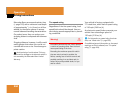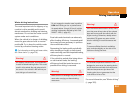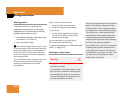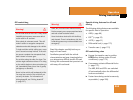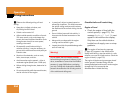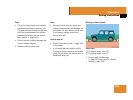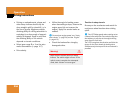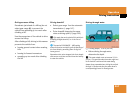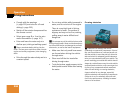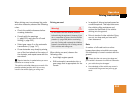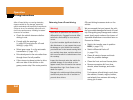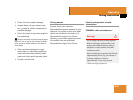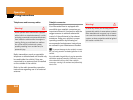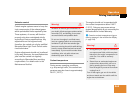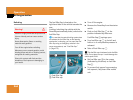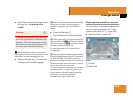
258
Operation
Driving instructions
ț Comply with the warnings
(
୴ page 253) and rules for off-road
driving (
୴ page 253).
ț Switch off the exterior lamps as well as
the climate control.
ț Select gear range 2 or 1 on the auto-
matic transmission (
୴ page 167).
ț Enter and leave the water only at a
shallow spot, driving at walking speed.
ț Drive through the water slowly and at a
constant speed.
ț Do not stop vehicle while immersed in
water, and do not shut off the engine.
There is a very high level of driving
resistance in water. The surface is
slippery and may not be firm, making
pulling away in water difficult and
dangerous.
ț Make sure that only small bow waves
are formed when driving the vehicle
through water.
ț Clean mud off the tire tread after
driving through water.
ț To dry the brakes, apply pressure to the
brake pedal several times after leaving
the water.
Crossing obstacles
!
Never accelerate before driving into the
water. The bow wave could force water into the
engine and auxiliary equipment, thus damaging
them.
!
Do not open any of the vehicle’s doors while
driving through water. Water could otherwise en-
ter the vehicle interior and damage the vehicle’s
electronics, as well as the interior equipment.
!
Obstacles can damage the vehicle
underbody or suspension components. If possi-
ble, use the assistance of a second person out-
side the vehicle to scout the path you intend to
take and check for adequate ground clearance
when you cross obstacles with your vehicle. The
person assisting you outside the vehicle should
always be a safe distance away from the vehicle
and positioned so that he or she cannot get hurt
in case of any unexpected vehicle movement.
After off-road driving or crossing obstacles,
inspect vehicle for any damage, especially
vehicle underbody and suspension components.
Failure to do so can adversely affect the vehi-
cle’s future performance, including increased
chance of an accident.



